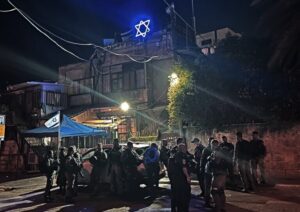Jewish settlers stole my house. It’s not my fault they’re Jewish.

Israeli occupation forces stand in front of the Ghawi family home in Sheikh Jarrah that was taken over by Israeli settlers in 2009 and a neon star of David placed on top, May 2021
Mohammed El-Kurd writes in Mondoweiss:
When we were growing up in occupied Jerusalem, the people seeking to expel us from our neighborhood were Jewish, and their organizations often had “Jewish” in their name. So were the people who stole our home, scattered our furniture in the street, and burned my baby sister’s crib. The judges banging their gavels in favor of our expulsion were also Jewish, and so were the lawmakers whose laws facilitated and systematized our dispossession.
The bureaucrat issuing—and sometimes revoking—our blue ID cards was a Jew, and I especially despised him because a stroke of his pen stood between my father and my father’s great-great-grandfather’s city. As for the soldiers that were frisking us to check for those IDs, some of them were Druze, some Muslim, most of them Jewish, and all of them, according to my grandmother, were “godless bastards.” Those who administered the rifles and handcuffs, those who wrote the meticulous and murderous urban plans were—you guessed it.
This was no secret. We lived under the rule of the self-proclaimed “Jewish State.” Israeli politicians have exhausted this line, and their international peers nodded along. The army declared itself a Jewish army and marched under what it has called a Jewish flag. Jerusalem city councilmen boasted “tak[ing] house after house” because “the bible says that this country belongs to the Jewish people,” and Knesset members sang similar tunes. These legislators weren’t fringe or far-right: the Israeli nation-state law explicitly enshrines “Jewish settlement” as a “national value … to encourage and promote.”
Still, though this was no secret, we were instructed to treat it as such, sometimes by our parents, sometimes by well-meaning solidarity activists. We were instructed to ignore the Star of David on the Israeli flag, and to distinguish Jews from Zionists with surgical precision. It didn’t matter that their boots were on our necks, and that their bullets and batons bruised us. Our statelessness and homelessness were trivial. What mattered was how we spoke about our keepers, not the conditions they kept us under—blockaded, surrounded by colonies and military outposts—or the fact that they kept us at all.
Language was more of a minefield than the border between Syria and the occupied Golan Heights, and we, children at the time, were expected to hop around them, hoping we don’t accidentally step on an explosive trope that would discredit us. Using the “wrong words” had the magical ability to make things disappear; the boots, bullets, batons, and bruises all become invisible if you say anything in jest or in fury. Even more dangerously, believing in “the wrong things” rendered you deserving of this brutality. Citizenship and the right to movement weren’t the sole privileges robbed from us, simple ignorance was a luxury as well.
